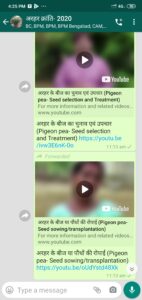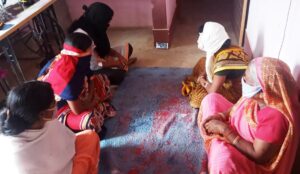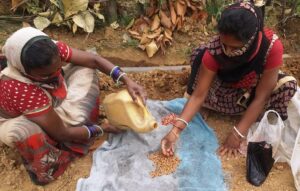The ongoing COVID-19 pandemic has affected all walks of life. In India, despite some relaxation for agriculture activities during the lockdown, farmers all over the country faced challenges in selling their Rabi produce (winter agricultural season), especially access to markets and the drop in prices.
In Jharkhand, Rabi is not a prime cropping season, and farmers here worried about the upcoming Kharif (crops sown in the monsoon); specifically about access to and availability of inputs and fertilizers for Kharif crops.
Through rapid surveys early in the lockdown, Digital Green reached over 250 smallholder farmers across Jharkhand to get a pulse of the situation with the purpose of figuring out the means and ways we could continue supporting them in a more targeted manner. The findings from the survey conducted in April 2020 were discussed with our partner JSLPS and the team brainstormed on alternate ways of providing agricultural extension support to the farming community.
Through the surveys also found that the farmers needed technical extension information on Kharif crops and non-pesticide management (NPM) practices to plan for their Kharif activity at the earliest and reduce their dependence on inputs from markets and supply chains which were affected by the lockdown.
In this situation, when guidelines issued by the Government would not allow commun ity meetings (for our classical video dissemination), we explored WhatsApp, a popular Internet-based messaging platform.
ity meetings (for our classical video dissemination), we explored WhatsApp, a popular Internet-based messaging platform.
We started sharing the relevant videos (which were repurposed for sharing on WhatsApp) from the 1st week of May 2020 to the frontline workers or agriculture extension agents and farmers who had smartphones. We managed to reach farmers in all 12 districts in the state where we are working with MKSP-JSLPS. The extension agents also reached out to farmers who were not smartphone users and disseminated the videos through their own mobile in a smaller group while maintaining social distancing norms. Currently, we’re sharing two videos every fortnight with the farmers and the extension agents.
 In this project funded by Oracle, we have reached over 400 extension agents who have in turn reached and disseminated the information to over 7000 farmers, either through WhatsApp or direct dissemination. 8 videos on improved agri-practices of pigeon-pea and NPM practices have been shared so far.
In this project funded by Oracle, we have reached over 400 extension agents who have in turn reached and disseminated the information to over 7000 farmers, either through WhatsApp or direct dissemination. 8 videos on improved agri-practices of pigeon-pea and NPM practices have been shared so far.
It is very encouraging to see that the adoption of disseminated practices have started taking place. Farmers are now actively preparing NPM inputs for their Kharif crop and have started sowing the pigeon pea crop.
 We plan to reach over 40,000 unique farmers during 2020-21, with multiple interventions, including pigeon pea, NPM practices, Agri-Nutrition Garden during this Kharif season and with mustard, wheat and potato during the upcoming Rabi season.
We plan to reach over 40,000 unique farmers during 2020-21, with multiple interventions, including pigeon pea, NPM practices, Agri-Nutrition Garden during this Kharif season and with mustard, wheat and potato during the upcoming Rabi season.
We’re keeping a close eye on the ground and as the situation evolves, we hope to be able to support the smallholder farmers through ICT channels that are most accessible to them.
